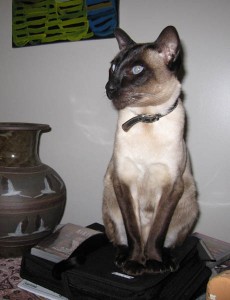Changes in jumping behaviour are the most obvious sign of arthritis in cats.
Cats with elbow arthritis are reluctant to jump down and seem to pour themselves off the bed or cupboard. Because they lose agility and flexibility they land with a thud and stand a moment before moving off.
Cats with arthritic knees are reluctant to jump as high as before. They use chairs to get onto tables or abandon high resting places altogether. Painful knees make them hesitate before jumping, scramble rather than jump or even miss the target. Some cats pull themselves up onto the couch or bed rather than spring up. Occasionally accidents happen because an old cat is unwilling to climb into the litter tray.
Cats that move stiffly have arthritic backs. Because it is difficult for them to groom their sides and backs their coats look rough or matt into tufts. Nice cats turn into cranky cats when they are picked up or petted because of the pain. Many spend the day resting and avoid play altogether.
You can help your arthritic cat. Set up stools or boxes as steps onto favourite resting places. Encourage gentle play to strengthen muscles by trailing ribbon and batting balls. Keep bodyweight down to reduce strain on old joints. Most important of all provide a warm, well-cushioned sleeping area.
